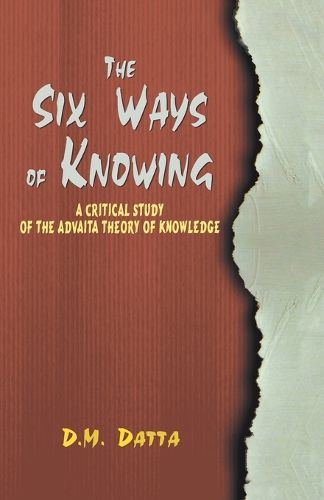Readings Newsletter
Become a Readings Member to make your shopping experience even easier.
Sign in or sign up for free!
You’re not far away from qualifying for FREE standard shipping within Australia
You’ve qualified for FREE standard shipping within Australia
The cart is loading…






This title is printed to order. This book may have been self-published. If so, we cannot guarantee the quality of the content. In the main most books will have gone through the editing process however some may not. We therefore suggest that you be aware of this before ordering this book. If in doubt check either the author or publisher’s details as we are unable to accept any returns unless they are faulty. Please contact us if you have any questions.
During the years 1925n28, the writer had the privilege of occupying the Prabodh Chandra Basu Mallik Chair of Indian Philosophy at the Bengal National Council of Education. In compliance with the wishes of the founder of this chair he was called upon to undertake some investigation in Indian Philosophy and publish the results of his labour. This volume represents his work in discharge of that duty. He attempts to study critically some important epistemological theories of one of the chief schools of Indian Philosophy, namely, the monistic Advaita School of Vedanta. Western Philosophy has generally recognized two ultimate sources of knowledge, immediate knowledge or perception, and mediate knowledge or inference. But there has been a variety of opinions on this matter among the different schools of Indian Philosophy. These views are not mere dogmatic assertions. Each school gives elaborate arguments for its own position. This book deals with the Vedanta standpoints of these different kinds of knowledge, with all the arguments given by the Vedantins to prove their independence and ultimacy, are critically discussed here in the light of modern Western concepts, and the attempt has been made to present the conclusions to students of Western Philosophy in a clear and lucid form. This book deals with the Vedanta standpoint, according to which there are six sources of knowledge. The conceptions of these different kinds of knowledge, with all the arguments given by the Vedantins to prove their independence and ultimacy, are critically discussed here in the light of modern Western concepts, and the attempt has been made to present the conclusions to students of Western Philosophy in a clear and lucid form. As the purpose of this work is to bring the problems, concepts and theories of the Vedantins within the focus of modern Western thought, the method adopted is one of critical analysis, comparison issues from extraneous aspects with which they are often associated.
$9.00 standard shipping within Australia
FREE standard shipping within Australia for orders over $100.00
Express & International shipping calculated at checkout
This title is printed to order. This book may have been self-published. If so, we cannot guarantee the quality of the content. In the main most books will have gone through the editing process however some may not. We therefore suggest that you be aware of this before ordering this book. If in doubt check either the author or publisher’s details as we are unable to accept any returns unless they are faulty. Please contact us if you have any questions.
During the years 1925n28, the writer had the privilege of occupying the Prabodh Chandra Basu Mallik Chair of Indian Philosophy at the Bengal National Council of Education. In compliance with the wishes of the founder of this chair he was called upon to undertake some investigation in Indian Philosophy and publish the results of his labour. This volume represents his work in discharge of that duty. He attempts to study critically some important epistemological theories of one of the chief schools of Indian Philosophy, namely, the monistic Advaita School of Vedanta. Western Philosophy has generally recognized two ultimate sources of knowledge, immediate knowledge or perception, and mediate knowledge or inference. But there has been a variety of opinions on this matter among the different schools of Indian Philosophy. These views are not mere dogmatic assertions. Each school gives elaborate arguments for its own position. This book deals with the Vedanta standpoints of these different kinds of knowledge, with all the arguments given by the Vedantins to prove their independence and ultimacy, are critically discussed here in the light of modern Western concepts, and the attempt has been made to present the conclusions to students of Western Philosophy in a clear and lucid form. This book deals with the Vedanta standpoint, according to which there are six sources of knowledge. The conceptions of these different kinds of knowledge, with all the arguments given by the Vedantins to prove their independence and ultimacy, are critically discussed here in the light of modern Western concepts, and the attempt has been made to present the conclusions to students of Western Philosophy in a clear and lucid form. As the purpose of this work is to bring the problems, concepts and theories of the Vedantins within the focus of modern Western thought, the method adopted is one of critical analysis, comparison issues from extraneous aspects with which they are often associated.